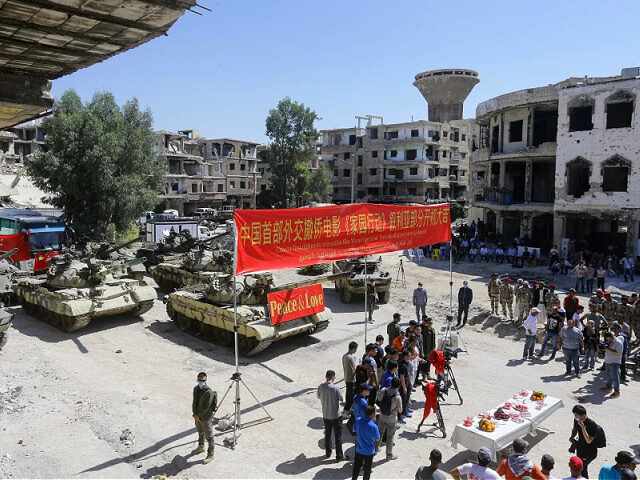Pro-Beijing action movie legend Jackie Chan angered Syrians and human rights activists this weekend by producing a movie that reportedly filmed scenes in Hajar al-Aswad, a town leveled by dictator Bashar Assad and occupied by Islamic State forces during the Syrian civil war.
Chan’s movie, titled Home Operation, is a fictionalized account of China’s evacuation of its nationals from Yemen during the early days of the still-ongoing Yemeni civil war.
China and India both orchestrated massive evacuation efforts in 2015, while the administration of then-President Barack Obama handled the situation about as well as Obama’s Vice President Joe Biden handled his withdrawal from Afghanistan. There was actually a website in 2015 called StuckInYemen.com offering private sector help to the people Obama abandoned, much as private rescuers have saved many of the people Biden abandoned in Afghanistan.
The Chinese military is extremely proud of its 2015 evacuation, which the People’s Liberation Army (PLA) describes as the first time it has rescued foreign nationals from a conflict zone.
To the dismay of many of his international fans, Chan is an ardent booster of the Chinese Communist Party, so he partnered with the United Arab Emirates (UAE) to produce a laudatory film about the PLA’s successful Yemen operation.

Western leaders now say Syrian President Bashar al-Assad must be involved in peace talks. Photograph: Vahid Salemi/AP Photo
“It takes the perspective of diplomats who are Communist Party members, who braved a hail of bullets in a war-torn country and safely brought all Chinese compatriots onto the country’s warship unscathed,” director Yinxi Song said of his film.
The Home Operation production decided filming in Yemen would be unacceptably dangerous because the civil war is still raging seven years later, so the filmmakers settled on the Syrian city of Hajar al-Aswad as a stand-in for Yemeni locations.
Hajar al-Aswad is located about 60 miles from the Syrian capital of Damascus. It makes a fine substitute for war-torn Yemen because it was bombed into ruins by dictator Bashar al-Assad during his own civil war, which began in 2011. Since China has good relations with Assad, the production was given permission to shoot among the ruins at a very reasonable cost.
AFP on Sunday described the city as a virtual “ghost town” since Islamic State jihadis who had infested its remains were expelled in 2018. Displaced residents and human rights groups seethed over what AFP described as “a motley crew of actors in Yemeni tribal attire, Syrian extras in uniform, and polo-wearing Chinese crew members” swarming through the town, along with the Chinese ambassador to Syria, who showed up for the launch party.
The New Arab quoted activists who denounced the film deal as a “shameful” effort to ignore the crimes of Assad, who is still under international sanctions for his brutality.

Actors are pictured in the Hajar al-Aswad neighborhood of the Syrian capital Damascus on July 14, 2022, during the filming of a scene in a film titled “Home Operation”, a Chinese-Emirati joint venture produced by actor Jackie Chan and inspired by real events of the emergency evacuation of Chinese and foreign nationals and diplomats during the early days of a civil war in Yemen in 2015. (Photo by LOUAI BESHARA/AFP via Getty Images)
“The Chinese fascist regime is an ally of Syria, and they are trying to whitewash their crimes in actions like this,” complained Syrian journalist Fared al-Mahlool. “The Chinese who came and filmed this movie should respect the Syrians whose homes were bombed and destroyed, leading to many Syrians becoming displaced.”
Angry Syrians told Chan his production was “causing great psychological harm” to the displaced former residents of Hajar al-Aswad, turning their suffering into “mockery on a universal scale.”
“So that’s why Bashar destroyed all of these cities – he wanted to make a film location set,” one Syrian commented sarcastically.
Chan’s movie is not the first Chinese propaganda film based on the Yemen evacuation. A 2018 film called Operation Red Sea was a highly sensationalized retelling of the same story, in which the PLA not only rescues Chinese nationals from a Yemen-like country but defeats terrorists and stops them from building a dirty bomb. Operation Red Sea became one of the highest-grossing films in Chinese box office history.
The actual Yemeni rescue operation was not particularly exciting — a few Chinese naval frigates peeled away from anti-piracy duty off the coast of Somalia, docked in Yemen, and ferried a few hundred people to Pakistan.

COMMENTS
Please let us know if you're having issues with commenting.